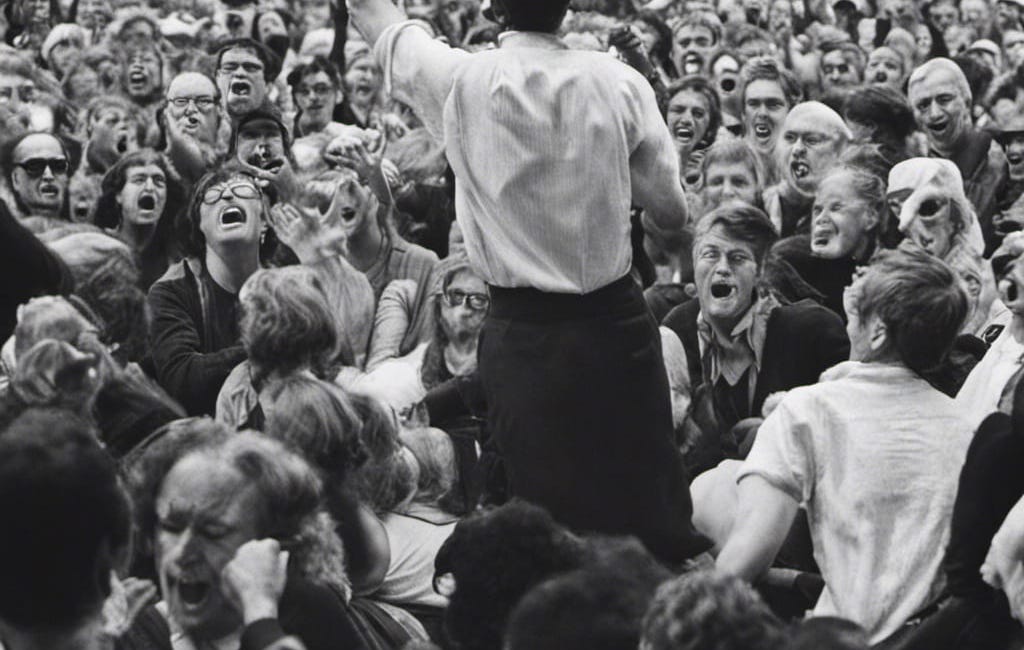Not in front of the children
Obvious omissions in media coverage of a murder in France

To succeed, perception management needs to be subtle. This is because mistrust arises once we've spotted it. We dislike feeling manipulated and once it's clear that someone is trying to manage how we see one thing it raises suspicions that 'they' might be doing it with every other thing.
For an action to be subtle it needs to be intelligently conceived and executed. Otherwise it looks blatant and either or both stupid and arrogant.
As children we learn quickly to spot casual dishonesty, a skill that is sidelined as we learn to function in the world. But we never lose it. We just learn which instances really matter to us and how to extract ourselves from situations where the cost of tolerating or overlooking them are too high.
This is fine in contexts like a job or a relationship, because you have agency to get out and find a situation where you're respected and trusted sufficiently with unpleasant truths.
Sometimes dishonesty is just baked into a situation and everybody knows this already, so that they can adjust their perceptions accordingly.
As a professional comms person I've made many a 'positive' announcement about negative developments in a business, knowing full well that nobody inside or outside believed them. I'm fine with this, because there's an unspoken agreement that 'spinning' when you have a problem is mostly accepted, provided it has zero negative cost for the recipient.
I think that this is probably what some media professionals believe they're doing in their reporting around a recent murder in France. One that seems to have included an element of racial animus, of the kind they don't like to acknowledge. The 'brown on white' variety.
Legacy media outlets probably think that no one reading about the murder is negatively impacted by the omission of material facts relating to the identity of a gang stabbing a person to death and injuring seven others and their possible motive. Even if we can't help noticing obvious gaps in the story if this isn't mentioned.
This is a moderate, good faith reading of the situation. They're trying to avoid escalation of a particular problem by not giving certain types of people an excuse to do various bad things.
It's obvious that the problem in their minds is the attitude of white indigenous people toward more recently-established brown people who do bad things. This must not be encouraged. And so the reports about more recently-established brown people are somewhat ... slippery. Well-intentioned omissions of things we already guessed feel that way, to me. Slippery. Not entirely truthful, while not being entirely dishonest.
Inevitably, others interpret this, especially the hyper-aware denizens of right-wing online places* very differently. There it is more simple. 'They' are doing CENSORSHIP and LYING again and that means 'they' are doing censorship and lying all the time about everything.
(*Just as an aside, I'm trying to dial back on midwit language, such as describing places as 'spaces'. When did places become spaces anyway?)
I sincerely maintain the moderate, good faith interpretation, because that's what I genuinely think is in play. It's a lot less stirring than CENSORSHIP! and LYING! but reality usually seems to me to bend more often toward well-intentioned incompetence than straight-up badness. Cock-up is more common than conspiracy, even if you technically can argue conspiracy of some kind.
This is the dynamic from which arose most of the Covid vaccine scepticism and why so many credentialed experts aren't trusted in general. If only our 'thought leaders' were just a bit more humble and honest about what they say and why they say it, various disagreements on policy, for example, might be less polarising.
Scientific and technocratic communication really is shockingly bad
Mistrust of 'experts' and institutions is old news now. Mistrust is a vibe and - like most vibes - it needs a better vibe, rather than evidence that it's 'wrong', to dislodge it. Establishing this better…
Today’s thought is prompted by reading stories a couple of times recently about 'Far Right' violence that turned out to have been in response to previous violence that wasn't given equivalent prominence. On both occasions I've noticed a reluctance to describe the excuse that was used by right-wing headbangers to go rampaging around, being antisocial idiots.
Instead the stories have been entirely about the threat to public order of Far Right extremists.
I agree that Far Right extremists are a threat to public order, so that framing seems fine to me.
Where I'm uncomfortable is in legacy media's unwillingness to mention all the salient facts that lead to these manifestations of the Right’s ugly side. Or to mention them so circumspectly that it feels like trying to decode a hidden message.
Not in front of the children
Last week in Crépol, a rural town in central France, a teenager was murdered when a gang crashed a dance party and ran riot with ... well, I'm not sure. Far Right websites say a certain type of cutting weapon was used in a specific kind of way. Legacy media mentions no weapons, only the resulting injuries, one of which was fatal and several others 'serious'. Nine suspects have since been arrested.
Earlier this week there was a 'Far Right protest' in connection with these events.
The prosecutor leading the case, Laurent de Caigny, says that nine witnesses have reported that the gang was talking about "white people".
You have to piece this story together like a jigsaw, because the original story hasn't really been directly recounted.
To illustrate. France24 (which reproduces most of its content from sources like Agence France Presse - AFP) used a curious phrase in its reporting of the resulting arrests two days ago, distancing itself from some of the facts of the case.
"Even before the arrests, far-right politicians had been quick to blame the attack on youths from immigrant backgrounds from public housing"
The reason that I think this is a curious choice of language is that it was youths from immigrant backgrounds living in public housing. People at the party said who the attackers were.
Even before the arrests.
Quick to blame.
In other words, everyone involved knew that French Algerian and French Moroccan youths turned up at a rugby club party, killed someone and wounded seven others and it was left entirely to the 'far-right' to mention this.
Even before the arrests.
Quick to blame.
Even before the postmortem on Roger's body, relatives were quick to attribute his death to injuries sustained when he fell 40 feet off the roof is a sense-mangling sentence of a similar kind. They saw him fall. They said what happened.
This story was being subtly framed so that what actually happened was shunted aside in favour of who was saying what happened.
Looking through the legacy media coverage of that murder you notice that the only mentions of the attackers' identities begin when 'far-right' figures start pointing out who they were.
Everyone connected with this event - including the media whose job it is to report - already knew this salient fact but kept it back. Even though there was plenty of verifiable information about it on social media within hours.
This is not to advocate for headlines like 'White teenager murdered by brown men', as doubtless many wingnuts on the right would love. The point isn't who is to blame for crimes. It could be a drug turf war, for all I know. Police and Prosecutor are still establishing the detailed facts of the case.
The point is the dishonesty and the patronising and how that probably serves as an entrée into the racist Right for some people who notice it.
My intuition is that this 'not in front of the children' approach, where certain things must remain unsaid to ordinary people like you and me, who can't be trusted with the facts, is counter-productive.
It's a kind of avoidant and patronising behaviour that erodes trust in institutions, especially longstanding media institutions.
I see this constantly called CENSORSHIP! and LIES! but maintain that it's really about good intentions and a wish to avoid creating even more friction in the world. It is of course a mild form of censorship and lying by omission, but quite easily justified by a defence of responsibility.
Also, the totalising CENSORSHIP! and LIES! claim fails to acknowledge that the legacy media does mostly mention all the facts. Albeit under the guise of 'already the far-right were saying...'.
I can see that they're doing their best but I can also see that it's not really working. If a reader is having to figure out what's going on between the lines in a story, this is either a writing-quality issue or a red flag that your perceptions are being managed.
Continually pushing a messy issue, like the persistent problems of non-native non-assimilation in countries like France, off-screen is that discussion then concentrates in places that love this kind of thing. Where people feel justified to spend all day raving on about the 'decivilising' effect of migration into the west.
You can find plenty of that chatter in relation to this case. Google predictably down-ranks extremely migrant-hostile sites but search terms that include their specific talking points will reveal them. Consulting several of them in connection with this piece was a dispiriting and frustrating experience. Partly because they are so unpleasant and febrile. Also because they are empowered by the attempt to 'marginalise' their concerns.
They can say WE TELL THE TRUTH! while pointing at legacy media being obviously reluctant to acknowledge certain truths.
Everyone knows there's an adult public conversation to be had about many aspects of immigration and integration in certain countries. Everyone also knows that the issues are denied or re-framed as a problem with the indigenous population's society and the catch-all 'hate' discourse. But every thinking person also knows that worries about it are not entirely driven by xenophobia, ignorance or moral turpitude.
It's a miserable hot potato that no one without a strong interest in loving or hating people of non-native extraction seems willing to discuss. Instead they just end up voting in greater numbers than anyone expected for people like Gert Wilders.
Legacy media of the non-partisan but liberal variety is stuck in this dilemma and looks paralysed by good intentions and a self-appointed responsibility not to encourage anti-migrant sentiment.
I'm sceptical that general legacy media is particularly influential in shaping public opinion, given a lack of evidence for this effect. As I've suggested previously, our media choices are probably downstream of our pre-existing opinions rather than vice versa.
Understanding media bias
When I was a child, Mondays, Wednesdays and Saturdays were when my comics came. Things like The Hornet, Cor, Wizard and Chips, Topper. Those were my comics. As well as entertainment they brought a kind of comfort. Familiar characters and themes, presented in a predictable way. …
The fact that most western legacy media disapproves of right-wing populists, who keep getting more votes every year, tells you something about this approach.
Which is that it doesn't really work.
I did something stupid last weekend, which was to publish two things when Thanksgiving doubtless occupied many readers’ thoughts, rather than miserable tales of broken political culture. Given the preponderance of American readers here, you might have missed a couple of posts that went down well with British readers in particular. Check these out. I hope you enjoyed your parties.
Clever title here
Personal status: dissatisfied with the Rarely Certain project. Post status: discursive, rambling, stream of consciousness. Mood: mischievous. Inspiration: Thanksgiving
Leave it to the clever people
Bristol Airport has unveiled a building dedicated to prayer, whatever your faith. As ever, when anyone tries to do something good, the baying crowd has other ideas. So Bristol Airport's 'Multi faith area' is 'coming under fire'. This is mediaspeak for posting tweets on X about how rubbish various people think it is.





